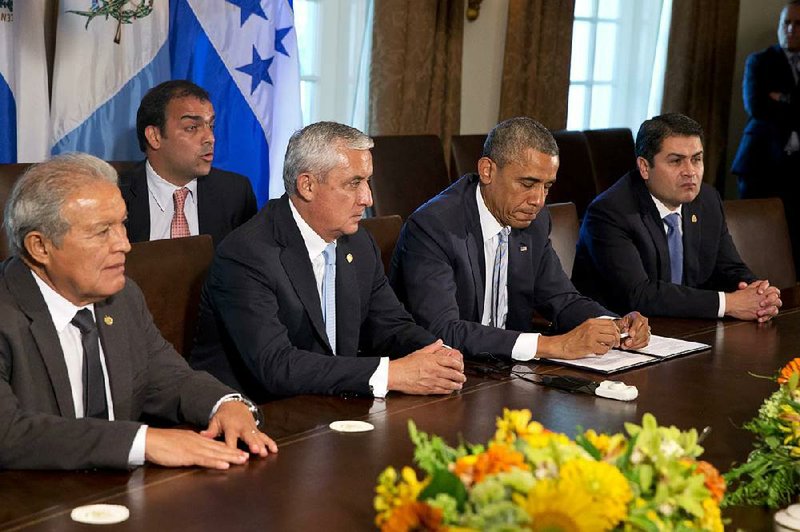WASHINGTON -- Pressing for action on Friday, President Barack Obama urged Central American presidents and congressional Republicans at home to help ease the influx of illegal aliens crossing the southwest border of the U.S.
While citing progress in addressing the flow of illegal aliens, he called on House Republicans to act on his request for emergency spending. With one week left before Congress' recess, Republicans were trying to unite behind a plan that would spend about one-fourth of what Obama requested.
"It is my hope that Speaker [John] Boehner and House Republicans will not leave town for the month of August for their vacations without doing something to help solve this problem," Obama said. "We need action and less talk."
Obama and Vice President Joe Biden met Friday at the White House with the presidents of Guatemala, Honduras and El Salvador.
The trio of nations has become one of the most violent regions in the world in recent years, with areas of all three countries under the control of drug traffickers and street gangs who rob, rape and extort with impunity.
Since last fall, the U.S. has seen a dramatic increase in the number of illegal aliens from the three countries arriving at the southern border, particularly children traveling without an adult guardian. The U.S. has said more than 57,000 unaccompanied children have entered the country illegally since October.
"I emphasized that the American people and my administration have great compassion for these children," Obama said after the meeting. He added, "But I also emphasized to my friends that we have to deter a continuing influx of children putting themselves at risk."
He also thanked the presidents for their efforts so far.
"Initial reports show that our joint efforts appear to be paying off," Obama said.
Guatemalan President Otto Perez Molina said Obama asked for two approaches -- that the region work with the U.S. to resolve the immediate crisis and that it develop a medium- and long-term plan to prevent such a flight of Central Americans in the future.
"What he asked was that we be prepared to receive the children who are not classified to remain here," Molina said. "Ultimately, we have a responsibility in our countries to be prepared to receive them and give them the attention and the processes they deserve."
Obama's demand for congressional action came as GOP lawmakers said they were attempting to coalesce behind a narrow package of changes including sending National Guard troops to the border, increasing the number of U.S. immigration judges and changing a law so that the foreign youths arriving by the tens of thousands could be sent home more quickly.
The package would cost less than $1 billion, several lawmakers said, far less than the $3.7 billion Obama requested to deal with the crisis.
A number of Republicans departing a special meeting on the issue in the Capitol said they had to act before leaving Washington late next week for their annual August recess.
"It would be a terrible message [to] leave town in August without having done anything, knowing that it's going to create even more of a crisis on the border," said Rep. Charlie Dent of Pennsylvania. "Doing nothing in my view means that these children will be sent from the border back to communities like mine."
Yet some conservative lawmakers remained skeptical about taking any action.
"The acceptable spending level is zero," said Rep. Louie Gohmert, R-Texas.
With Senate Democrats opposed to policy changes to return the children to their home countries quickly without judicial hearings, the prospects of striking a deal this week were shrinking.
Friday's White House meeting with the Central American presidents came as the administration considered creating a pilot program giving refugee status to young people from Honduras.
White House officials said the plan would involve screening youths in their home countries to determine whether they qualify for refugee status. The program would be limited and would start in Honduras but later could be expanded to include other Central American countries.
Obama said it is better to determine whether people are eligible for refugee status or for asylum under humanitarian grounds in their countries so they don't attempt a dangerous trek to the U.S. border if they aren't eligible.
The number who would get such clearance into the U.S. would be fairly small, he said.
Separately, the Homeland Security Department announced Friday that it was boosting spending for law enforcement agencies in the Rio Grande Valley. The money would permit local police to support Customs and Border Protection by enhancing security in the region.
Rep. Henry Cuellar, D-Texas, said in a statement Friday that law enforcement agencies across Texas received $23.1 million in Operation Stonegarden funding in the current fiscal year. That's up from $19.4 million last year and pays for overtime and equipment that local agencies use to aid border security.
Earlier Friday, a senior Obama adviser said the White House is taking seriously the possibility that House Republicans could initiate impeachment proceedings against the president if he acts on his own later this year on a broader immigration measure that could defer deportations for people who have been in the U.S. illegally for years.
Dan Pfeiffer said Boehner's effort to sue Obama over his use of executive authority "has opened the door for Republicans possibly considering impeachment at some point in the future."
"I would not discount that possibility," he said. "I think that when the president acts on immigration reform it will certainly up the likelihood that they would contemplate impeachment at some point."
Boehner has said he has ruled out impeachment.
"It is telling and sad that a senior White House official is focused on political games, rather than helping these kids and securing the border," Boehner spokesman Michael Steel said Friday.
Several House Republicans said there was some discussion in Friday's meeting of holding a vote, in concert with action on the border, to overturn an earlier Obama directive on immigration that deferred deportation for certain foreigners brought to the U.S. illegally as children.
Some critics have argued that the Obama directive and other presidential policies triggered the crisis.
President Juan Orlando Hernandez of Honduras, in a statement Thursday, pointed in part to "the ambiguity that has been the hallmark of the debate of the reform of the immigration process in this country."
"Here we have to say that the coyotes, the smugglers, who are very much a part of organized crime networks, perversely have sought to exploit those ambiguities and peddle a mistaken, a totally wrong interpretation to the parents of these children in saying, 'You can get your kids in the U.S., we can do it for you,'" Hernandez said in remarks at the Center for Strategic and International Studies.
He added that while "those coyotes, those smugglers are nothing other than the human face of an enormous criminal monster that has one foot firmly in the camp of the drug lords and in Central America," the other "second foot is here in the United States under American jurisdiction."
In recent weeks, the administration has mounted a campaign to counter any belief among Central Americans that they would be allowed to stay under U.S policy.
Pfeiffer also said Friday that Obama supports changes in a 2008 law that would give the administration more authority to turn back Central Americans at the border. But he said current proposals in Congress, including a bipartisan plan proposed by Cuellar and Texas Republican Sen. John Cornyn, do not meet White House standards of deterring illegal immigration while protecting legitimate claims for asylum from border crossers.
Information for this article was contributed by staff members of The Associated Press and by Michael D. Shear, Ashley Parker and Theodore Schleifer of The New York Times.
A Section on 07/26/2014


